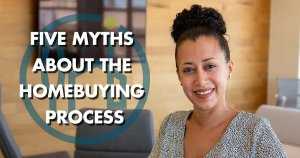Five myths about the homebuying process
 Homebuyer education is more than just the sharing of information—it’s also the correcting of misinformation. Way Finders Homeownership & Financial Education Manager Araceli Rivera shares her insight on five myths of the homebuying process.
Homebuyer education is more than just the sharing of information—it’s also the correcting of misinformation. Way Finders Homeownership & Financial Education Manager Araceli Rivera shares her insight on five myths of the homebuying process.
Myth #1: “I have limited financial resources—I can’t buy a home.”
Not true! People with limited financial resources, including those on a fixed income, are able to purchase homes. What you can afford—your buying power—varies based on your income. But the option is not closed to you. If your credit score is low, you might not be able to buy a home tomorrow, but we can help you map out a plan to get there in time. And, per fair housing laws, you have the right to live wherever you want. Unfortunately, people today are still hearing and absorbing the message that, “You shouldn’t buy in that neighborhood.” It still happens. And it’s against the law.
Myth #2: “I have a trusted real estate agent—I don’t need homebuyer education.”
One of the biggest things I advise people: Know that your buying power is your buying power. It’s not your real estate agent’s buying power. I have seen instances where clients let their real estate agents take the lead here. Remember that once the deal is done, that monthly mortgage payment—for the next 20 or 30 years—is yours, not your real estate agent’s. It’s so important to understand what you’re setting yourself up for. Way Finders’ First-time Homebuyer (FTHB) education will help you do this—and so much more.
Myth #3: “I know my credit score—I checked it on Credit Karma.”
While the website Credit Karma can give a window into your credit, it does not give an accurate credit score for the purposes of getting a mortgage and buying a home. In fact, the Credit Karma score may be 50 to 100 points above or below the credit score that lenders use when qualifying you for a mortgage. For homebuyers, it’s crucial to understand where and how to obtain your actual credit report.
When clients sign up for a one-on-one counseling session after taking the first-time homebuyer course, we pull their tri-merge credit report—which includes credit information collected from the three national credit bureaus—for free. And we make sure people understand how to read their report and what steps to take next, depending on their credit score. We are here to guide people through this process, so they understand their options.
Myth #4: “I know what I can afford—I was pre-approved for X amount.”
During the FTHB workshop, before we bring in any presenters (mortgage lenders, realtors, attorneys, inspectors, insurance agents), we start with budgeting and what you can afford. You may be pre-approved for a certain amount, but what can you comfortably afford each month? Spending less than what you are pre-approved for can help you live with more ease in your home—instead of feeling like you work for your home.
We also stress the importance of budgeting for emergency home repairs, because once you purchase a property, any future repairs are on you. And you don’t know when the water heater or furnace is going to go!
Myth #5: “I can find what I need to know online—I don’t need a class.”
There is no guarantee that what you find by searching online will be accurate, current, or in your best interest. Going through the process of buying a home can feel overwhelming in the best of times. Today, in a housing climate driven by high demand and rising prices—plus mounting pressure to skip the home inspection (don’t ever skip this!)—the need for accurate information is key.
When you take a FTHB class, the comfort level is there. You will learn from trained professionals who have extensive certifications. I’ve been in my role for more than four years and every time I attend a workshop, I learn something new. As a CHAPA, HUD, and NeighborWorks certified organization, the material we present is designed to help you move successfully toward homeownership. Upon completion of our FTHB workshop, the certificate you receive—which is good for two years—may also qualify you for down payment assistance and first-time homebuyer mortgage programs.
Attending a class is even more convenient today than ever before, and there’s sure to be a class that fits your busy schedule. So whether you want to take a class in the evenings or on weekends, in person or online, there are homebuyer education options available to you. If you haven’t done so already, sign up for a homebuyer education class today!


